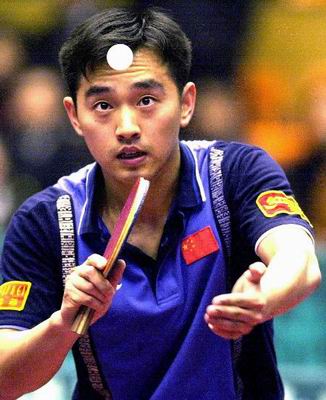King Kong keeps fighting
26/4/2005 16:12

Few have reached the dizzying height of King Kong.
Kong Linghui
was expected to retire after he beat legendary Jan-Ove Waldner of Sweden in the
men's singles final of the Sydney Olympics Games in 2000. But he didn't. He was
expected again to hang up his bat after the ill-fated 2004 Olympic tour. But he
refused to call it quits.
"Competing in an Olympics hosted by my own country
is a once-in-a-life opportunity. I need to work harder," he said.
Kong jumped
out of oblivion by nabbing two gold and one silver medals in the 1995 world
championships held in north Chinese city Tianjin. He hadn't expected to win the
singles gold and was just satisfied with joining the team competition.
Kong
saw Tianjin as his lucky place because he also won his first ITTF Pro Tour
Finals there.
The singles draw of the 1995 championships didn't look good for
Kong because he had to face Swedish veteran Peter Karlsson, whom he had never
won a set from, and defending champion Jean-Philippe Gatien of France. "I was
down 1-2 in the final against Liu Guoliang and I was lucky to come back to win
the singles title," said Kong.
Chinese coach Yin Xiao didn't think Kong's win
was based on luck. He had predicted two Chinese players, including Kong, were
good enough for the singles honor.
"I played with high spirits 10 years ago
and now play with experience and tactics," Kong said. "I want to celebrate the
10th anniversary of my first world championship with a good result in
Shanghai."
Kong ranked first in the first intra-squad competition prior to
the 2005 world championships. The Chinese team policy is the top four finishers
in the first two intra-squad competition are qualified for world championships.
"Number of world championship appearances means nothing to me," Kong said. "Only
gold medal matters to me."
At 12, Kong joined the Chinese youth team coached
by Yin Xiao. In 1991, Cai Zhenhua took the helm of the Chinese men's team and
called Kong and Liu Guoliang to service. Kong was sent to Sweden to study
European style in 1992 and two years later he claimed the singles title at the
Asian championships.
An early singles exit in his Olympic debut in 1996 was a
heavy blow to Kong and made him mature overnight. "As an athlete, one has to be
alert all the time and otherwise chances will easily slip away," he
said.
Kong still regrets his semifinal loss to Austrian Werner Schlager in
the 2003 world championships. "If I had beaten Schlager, I would have played
singles in the 2004 Olympic Games," he said.
Kong failed to make the cut when
the Chinese team announced its Athens Olympic lineup on March 17, 2004. He was
later included in doubles because Yan Sen, who paired up with Wang Liqin to win
the 2000 doubles gold, was injured in a car accident. Kong's third Olympics
lasted only 20 minutes.
"I had never been ousted in the first round," he
said, still smart with the humiliating loss.
The 29-year-old Kong said he
would never become a coach because of his short temper. "I am not a coach type.
Good athlete doesn't always make good coach."
Most popular with Chinese table
tennis supporters, Kong met a throng of fans at the Beijing airport when he
returned from Athens. "Other people welcomed Olympic champions, we came to see
our hero," said a keen Kong fan.
Kong Kinghui
Factfile
Date of Birth: Oct. 18, 1975
Height:
175cm
Started to play table tennis at 6 and joined the Heilongjiang
provincial team in 1986, the national youth team in 1988 and the national team
in 1991. He is the third grand slam winner of Olympic, world championships and
World Cup singles titles after Jan-Ove Waldner and Liu Guoliang, and the first
Chinese world champion playing in the handshake style. Kong expertly mixes
Chinese finesse with European topspin game and has no technical loophole. His
serves are well placed and set up his killer attacks.
Results:
1st
Asian youth championships in 1989
1st in men's team, singles and mixed
doubles in Asian championships
1st in men's team in the Asian Games in
1994
1st in men's team and singles in world championships in 1995
1st in
World Cup in 1995
1st in men's singles and doubles in Asian championships in
1996
1st in men's doubles in Atlanta Olympics in 1996
1st in men's team,
doubles, 3rd in men's singles in world championships in 1997
1st in World Cup
in 1997
1st in men's team and doubles in Asian Games in 1998
1st in men's
doubles in world championships in 1999
1st in world team championships in
2000
1st in men's singles, 2nd in men's doubles in Sydney Olympics in
2000
1st in men's team and singles, 2nd in doubles in world championships in
2001
1st in men's team in Asian Games in 2002
2nd in World Cup in
2002
2nd in men's doubles, 3rd in men's singles in world championships in
2003
1st in world team championships in 2004
1st in men's doubles in Qatar
Open in 2005
Xinhua news
|



